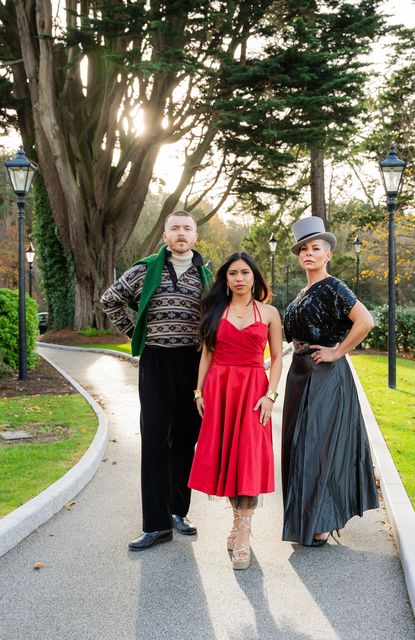With Christmas just around the corner and festive gatherings looming — attention turns to purchasing the best glitzy outfit for the time of year known as sparkle season.
And this includes the quintessential Christmas jumper.
It is estimated that the UK spends about £220m on novelty jumpers each year and, according to environmental charity Hubbub, about 95% of these were made either wholly or partially from plastic materials.
Aside from festive jumpers, sequins are also equally as harmful to the environment, which are made entirely from fossil fuels.
In the UK, 33 million sequined garments and accessories are purchased each festive season, and 1.7 million of these are thrown away after just one use.
Northern Ireland, in particular, has had a growing problem with overconsumption in recent years with 271, 501 tonnes of waste collected from households from April to June 2024, compared to 267,107 tonnes during the same period in 2023, according to the latest statistics from DAERA.
Read more
A spokesperson for Live Here Love Here said: “The European Commission has prioritised textiles in its 2020 EU Circular Economy Action Plan and the EU Strategy for Sustainable and Circular Textiles, as highlighted in the European Environment Agency’s 2023 report.
“Our advice for people wanting to don festive attire this year is to borrow, buy pre-loved or reuse what you have.”
The manager at Ireland’s only Oxfam superstore in Holywood is urging those to think sustainably and buy only second-hand this year.
“While it’s understandable to want to celebrate the festive season in style, the environmental cost of producing clothing that’s only worn once or twice is significant. Seasonal trends like Christmas jumpers and sequined outfits are driven far more by marketing than by necessity,” said Fiona Anderson.
Oxfam superstore manager Fiona Anderson
“Fast fashion brands and producers have perpetuated the idea that we need something new and “on-trend” for every occasion, including Christmas. This cycle of promoting limited-use items, especially with heavy discounts and advertising, encourages overconsumption and creates a false sense of need.
“The fashion industry is the second-largest polluter in the world, responsible for 10% of global carbon emissions. Items like Christmas jumpers, 95% of which are made from plastic-based materials, not only contribute to microplastic pollution but also highlight the broader issue of buying for one-time use.
“Globally, over 92 million tonnes of textile waste are produced annually — a staggering statistic. It’s worth bearing in mind when you’re purchasing a jumper to wear to one or two ‘12 Pubs’ crawls, though it’s also important to note that mega-corporations are primarily responsible for emissions. The responsibility must be placed on the systems and super-polluters, but individuals still need to move away from our culture of overconsumption. It’s a two-lane aim for us.”
Fiona and the team at Oxfam have organised a special ‘festive edit’ fashion photoshoot at the Culloden hotel to promote some of the second-hand items they have for sale in store.
The shoot was gifted to Oxfam by Collette O’Neill and features models Emma Thompson, Travis Gilbert and Coleen Marine.
Oxfam also offer a ‘Gifts with Purpose’ range which supports communities around the world to overcome poverty.
Moya Doogan, who’s originally from Donegal but has lived in Belfast for 10 years, has been highlighting the benefits of buying second-hand on her online platform environmentaléadaí (éadaí being the Irish word for clothes) and documenting her sustainable fashion journey to her 11,000 followers.
Moya Doogan
She also hosts regular clothes swaps called ‘Switch’ to help people shop second-hand.
The environmental activist told the Belfast Telegraph that people have become accustomed to the concept of buying new at Christmastime.
“We no longer think about the environmental impact of our outfit for the work Christmas party, or meeting our friends for some festive drinks,” she said.
“The fashion industry is absolutely to blame for this fad; sparkles and sequins have been around for centuries, but they used to be much more sustainable.
“Fashion companies absolutely capitalise on this, but we also, as shoppers, have a responsibility to slow down our consumption. Is there really that much of a difference between last year’s dress and this year’s “must have”? Or are we just falling victim to multimillion-pound marketing campaigns?
“Single-use seasonal items don’t stop at clothing — trees, decorations and presents! I’d really recommend only buying things you know that someone will love and treasure for years to come. Even better is to gift an experience — think of concert tickets, a spa day or a cookery class. Not only is this better for the environment than a trinket that will be binned or regifted, it will guarantee more quality time with your loved one.”
Moya is hosting a ‘Switch’ event on 12 December at Anam Café in West Belfast and also at Live Here Love Here’s Fashion Forever Festival on 21 December at 2 Royal Avenue.
Top tips to shop sustainably
• REUSE OR SWAP: Dig into your wardrobe or swap jumpers with friends or family • BUY SECOND HAND: Visit an Oxfam Ireland shop and other charity shops for some unique finds or attend a clothes swap event • UPCYCLE OR DECORATE: Personalise existing clothes with festive embellishments instead of buying new ones. Try not to buy materials made from plastic. • RENT OR BORROW: For parties, consider renting an outfit rather than purchasing one you’ll rarely wear. • SUSTAINABLE GIFTING: gift an experience or a class for someone this Christmas instead of buying items people may not necessarily need


